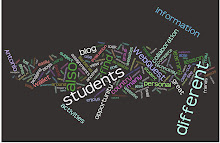Sunday, April 11, 2010
Internet-Based Learning Environments
“Every Michigan student will have meaningful technology-enabled learning opportunities based on research and best practice that include virtual learning experiences.”
Students in grades 6 - 12 need to have 20 hours of online experience before they graduate. It states that the students will, "become familiar with a key means of increasing their own learning skills and knowledge. It will also prepare them for the demands that they will encounter in higher education, the workplace, and in personal life-long learning. While students informally develop technology skills and gain experience through their media-rich lives, an online learning experience will require them to complete assignments, meet deadlines, learn appropriate online behavior, and effectively collaborate with others in an instructional setting." Basically: they need to get ready for the real world with ever-changing demands and new technologies.
Recently, I was discussing with my world language colleague how we could create and utilize one of these technologies in the classroom that qualify as an online experience: The Electronic Portfolio.
In the state of Michigan, they recently decided that students have to have 2 years (or the equilvalent) of a World Language. However, they absolutely have no idea what this entails, such as one state exam to pass out of this, or will the district decide how to prove that they've had this experience? We want to be prepared and expect the unexpected.
We are planning to create an online portfolio for the students that we would maintain from grades K-2 and then would begin updating with their own work at the 3rd grade level. They would maintain this until their last language class. We are still working out the details and are having an issue with how we would house each student's work and progress. Technology is evolving so quickly that we are afraid they would create a portfolio in Kindergarten (well, we would) and then by 3rd grade we'd have to switch programs.
To create these projects that would be available on their electronic portfolios, we would use different types of strategies. We could teach so many different topics and benchmarks, such as using simulation and problem solving to teach weather in Latin America and create a vlog to post on their portfolio to showcase their progress. Through scaffolding, we could create Wikis to teach about culture and have students in other countries contribute to the learning experience by using the Wiki as well. We could discuss things like food, music, hobbies, and past times and we could break down negative attitudes from the get-go! It would cover an entire Michigan World Language Standard (Culture).
Many Web 2.0 technologies would be simple to integrate meaningfully. I think it would be easy to integrate a lot of the things that they recommend in the Michigan Companion Document, however, as I've read amongst my peers, WebQuests would be difficult to integrate simply because they take a lot of time to make quality Quests and there aren't many out there that are worthy.
Subscribe to:
Post Comments (Atom)


No comments:
Post a Comment